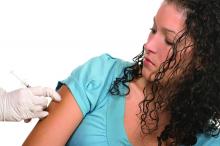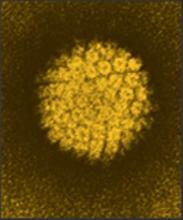, said Maddalena D’Addario of the University of Bern, Switzerland, and her associates.
In seven controlled trials in 11 countries that directly compared two-dose and three-dose HPV vaccine schedules, teen girls receiving two doses of HPV vaccine with a 6-month interval between them had noninferior antibody responses to HPV16 and HPV18 for at least 2 years, compared with girls receiving three doses.
In one study in India, teen girls who received two or three doses of HPV vaccines developed no persistent new HPV infections. When comparing different two-dose schedules, those with longer intervals between doses had higher geometric mean concentrations of antibodies.A limitation to this study is that there is no established immune correlate of protection, so the clinical significance of HPV antibody concentrations is uncertain, the researchers cautioned.Read more in the journal Vaccine (2017 May 19;35[22]:2892-901).



